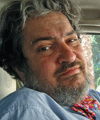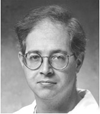...I am an axe
And my son a handle, soon
To be shaping again, model
And tool, craft of culture,
How we go on.from Axe Handles, Gary Snyder.
I recall two mantras that circulated through the residents from my years at Wisconsin; "run silent, run deep," and more importantly, "do the right thing." "Do the right thing" was our constant reminder not to take shortcuts, not to be lazy, not to leave things half done. Those were the days before pulse oximeters and gas monitors, and we all cruised along much closer to the dimly perceived edge of the cliff. It was a time when bradycardia was BAD (it meant hypoxia, and not beta-blockade), and the surgeons would alert us that "the blood looks dark" as a precautionary warning. It is so long ago, we mostly didn't think to worry about tachycardia induced ischemia (yikes!) and we mostly didn't wear gloves (yikes again!) As a resident and fellow, I was surrounded by men and women who knew what they were; Anesthesiologists, capital A, and who were both proud and humble at the same time. These were people who taught me how to live in the often brutish world of the OR and maintain my self-respect and discipline. They taught me how to manage a patient and an operating room. No big fuss; just do the right thing.
The Wisconsin Anesthesia department was very close; it was as tight a team as I have ever been on, although there was the usual (and perpetual) faculty bickering that is an invariable (and endearing) feature of academic departments; that bickering was like the roar of the surf, waxing and ebbing by turns, but never absent. I miss that agitation, which encompassed everything, from anesthesia technique to the chairman's latest pronouncement. It was all very clubby. Private practice is lonely by comparison. The attitude is "I do it all day, why do I want to talk about it?" The Wisconsin anesthesia residents of that era saw themselves as, well, sort of better than other residents. It wasn't an arrogant thing, exactly... It was more of a (smug) self-assurance; the department taught us how to put in tubes and lines right away, so we all weren't afraid of procedures. We were the go-to people in a code. During our rotating internship, the faculty kept a close eye on us as we served on various medical and surgical services. We were family. Various medical and surgical residents were allowed into our fraternity. More than one switched to anesthesia, I suspect, because we had so much esprit and fun. We knew who we were.
I marched off to a fellowship at Mass General, which had a whole other culture; fierce and intense. It was a time when the push was on for anesthesia critical care. In the previous two decades, Anesthesiologists had more-or-less invented mechanical ventilation, peep, blood gases and IMV ventilation. By my time, the surgeons had begun pushing back... The anesthesia residents, fellows and faculty were merciless, driven by the goal of intellectual superiority. Mass General was anesthesia and critical care boot camp during war time. There was even a group of residents who never sat in the OR ("the surgeons don't sit, so neither do we, and neither will you, if you are tough like us" "ahhh, yeah...sure")
I've always been a casual student of the history of anesthesia; I stress casual here. Mostly, I see in hindsight, it has been a way to maintain my sense of self, and as a defense against the ego-eroding influence of well, you know... We are human, and humans are social beings; we generally (though not exclusively) derive our identities from our tribe. My tribe was the anesthesia critical care tribe, and when I fell off that wagon (I was pushed too, by some fundamentally mean spirited and anti-intellectual surgical professors) I felt like I had been left at the side of the road.
July is a special time at anesthesia residencies; it's tutorship time. Tutorship is when the new residents are given one-on-one supervision by a faculty person for a number of weeks until they are deemed safe to be given a little space. It is a time when the newbies are introduced to, dare I say it.. the "mysteries" of anesthesia. Its culture, its sense of itself. I consider anesthesia to be a somewhat oppressed or subjugated culture. We are always under the eye of the surgeon, who still considers himself to be "the Captain of the Ship," even if he is too discrete to say so. We used to say, "surgeons are Spartans, Anesthesiologists are Athenians" More appropriately, I think surgeons are Romans and Anesthesiologists are Greeks during the era of empire... Like any oppressed culture, anesthesiology has a rich tradition in lore and anecdote, and residencies are the ark that maintains that culture and tradition.
My tutors were George Bush, Eldon Swenson and David Fleming. Three remarkable men, who taught me how to be an Anesthesiologist, and more importantly, what it meant to be an Anesthesiologist. I have never thanked them publicly for all they taught me. I do so now. Even twenty-five years later, I occasionally hear them, and much of the rest of the faculty, in my mind. Thanks as well, to all the tutors out there who are passing on the art and traditions of anesthesiology.
And now, for a closing story. It was 1982, and I was the resident in the heart room, with John Atlee as my attending. The surgeon was Parmjeet Chopra (a good man); John and Pommie were arguing about some or another thing; finally, Pommie shouted in exasperation, "I am the captain of the ship!" John looked across the screen and said, "sure you are, but I am commodore of the fleet," and walked out...
Anesthesiology has an extraordinary, proud tradition; it is of medicine, but like surgery, it is something else, as well; I fancy it is something more...
 Mitch Keamy is an anesthesiologist in Las Vegas Nevada
Mitch Keamy is an anesthesiologist in Las Vegas Nevada
 Andy Kofke is a Professor of Neuro-anesthesiology and Critical Care at the University of Pennslvania
Andy Kofke is a Professor of Neuro-anesthesiology and Critical Care at the University of Pennslvania
 Mike O'Connor is Professor of Anesthesiology and Critical Care at the University of Chicago
Mike O'Connor is Professor of Anesthesiology and Critical Care at the University of Chicago
 Rob Dean is a cardiac anesthesiologist in Grand Rapids Michigan, with extensive experience in O.R. administration.
Rob Dean is a cardiac anesthesiologist in Grand Rapids Michigan, with extensive experience in O.R. administration.
fascinating. where i come from only once in my training was an anaesthetist called for a resus (code) outside theater. that very very junior surgeon did not continue much longer in surgery. i can't imagine needing to call an anaesthetist for anything other than to dope. however the type of anaesthetist you describe would be very welcome to me.
Posted by: Bongi | July 23, 2024 at 01:10 PM
Bongi, thanks for visiting the site. As the mechanics of administering anesthesia have become less of a juggling act (gas monitors, advanced pharmacology, pulse oximeters) it has freed up the attention of a good anesthesiologist to expand his/her attention to ever bigger perspectives regarding the ongoing medical care of the surgical patient; we were trained to consider ourselves the surgeon's partner, not just his help, and we strove (and still strive) to be worthy of our own self-image. Thanks for commenting
Mitch
Posted by: mkeamy | July 23, 2024 at 07:05 PM
i can't imagine needing to call an anaesthetist for anything other than to dope.
Posted by: fingertip pulse oximeter | March 26, 2024 at 10:49 AM